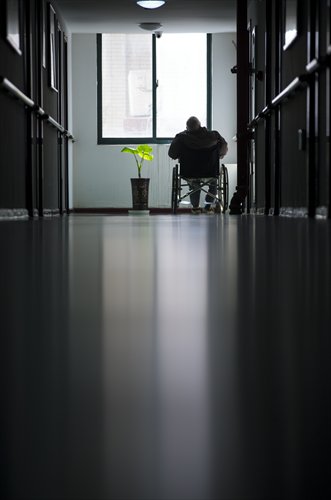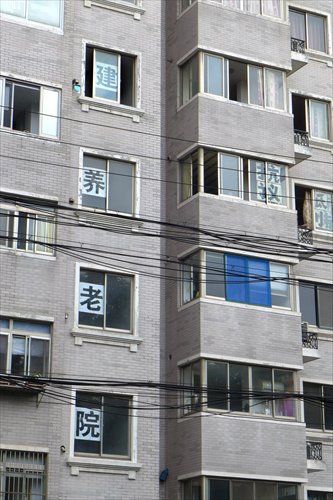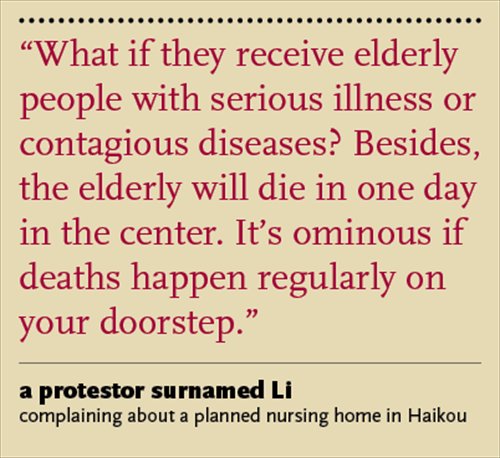Chinese death taboo makes it hard to develop care homes despite aging society
China is moving towards an old-age crisis as the country rapidly ages. Despite skyrocketing demand, firms trying to expand or start care homes are facing not-in-my-backyard protests. The demonstrators believe that these old people's homes will push down house prices and even bring "bad luck" to an area. Care home managers have asked the government to do something to eliminate these superstitions and to help the sector grow so China's elderly can receive the care many of them need.

An elderly man rests in the corridor of a nursing home in Xi'an, Northwest China's Shaanxi Province. Photo: CFP
China desperately needs to develop a greater capacity to care for its old people. However when local governments and businesses attempt to bring these services to communities, they are often met with protests.
China has the largest elderly population in the world, with the number of citizens over 60 totaling 220 million by the end of 2015. This figure is projected to surpass 300 million by 2025.
Despite this demand, work on an elderly care center in a residential community in Haikou, capital of South China's Hainan Province, has been suspended for three months due to protesting locals.
The mostly elderly or middle-aged protestors are holding rallies and obstructing work because they worry the nursing home will appropriate their public utilities and bring contagious diseases and bad luck to the area.
Some locals are particularly worried about the prospect of lots of people dying in the home.
Death remains a taboo topic in China - one way this manifests itself is that many elevators in the country do not have a "4" button, as this word is a homonym for death in Chinese.
The company behind the planned project, Fullcheer Senior Industry Development Co., Ltd, a Hunan-based private firm, has guaranteed local residents that the facility will not provide hospice or mortuary services, but their efforts were in vain.
"We feel helpless. We've gotten official permission for this project. The government has gotten involved in the mediation, but it is progressing slowly," Fullcheer CEO Huang Zihan told the Global Times.
Such protests are not unusual. Major cities including Shanghai, Chongqing, Nanjing, Hangzhou and Changchun have witnessed similar demonstrations against care homes for the aged.
"As integrated center- and home-based senior care services are promoted nationwide, such conflicts will certainly increase unless the government does something," Wang Xiaolong, president of the Beijing-based Cuncaochunhui Home for the Aged, told the Global Times.
"Many people aren't aware of the benefits of this service mode. Local governments fail to publicize the service and fight against the illegal violent obstructions," he added.
In demand
In 2011, Wang and four of his Tsinghua University classmates invested more than 10 million yuan ($1.5 million) on renting a house in central Beijing and turning it into a care home for the elderly.
He said some people living near the home objected to it at first, but they have come to accept it. All of the center's 100 beds are now occupied and there is a 700-person waiting list, Wang said.
Most of the center's elderly residents previously lived nearby. Most elderly people prefer to stay in care centers in their communities, and many will not move to homes if they are too remote.
According to a report released by the China Research Center on Aging last year, there are about 5 million beds in China's old people's homes, but nearly half of them are vacant. The report blames this on the fact that many centers are either too expensive or are located on the outskirts of cities.
"Community-based centers also deliver a range of services such as meals, nursing care, rehabilitation services and personal care to patients who are still living in their homes," Wang said, adding that his center cares for around 5,000 such elderly people.
This works well with the Chinese culture of care, as many families see sending an elderly member of the family to receive care in a facility as "unfilial."
This system efficiently uses the resources of families, the country and the market, he added.
The monthly cost of live-in care at the Cuncaochunhui Home for the Aged is between 3,000 yuan to 5,000 yuan depending on the senior's needs, according to Wang.
Several elderly people told the Global Times they hope such services were available in their communities. "If we could enjoy professional care at home, the children could go to work and on outings without worrying about us," said Yan Ruiying, 75, a resident of Changsha, Hunan Province.

Banners protesting against the construction of a nursing home for the elderly are visible through the windows of a nearby apartment building in Shanghai, on August 9, 2015. Photo: CFP
Protests
However, the protestors in Haikou don't see it that way. "We heard that the center will also offer medical services. What if they receive elderly people with serious illness or contagious diseases? Besides, the elderly will die in one day in the center. It's ominous if deaths happen regularly on your doorstep," a protestor surnamed Li told the China Youth Daily.
In June 2013, Fullcheer has signed an agreement with the Haikou Civil Affairs Bureau to build a service system for old people that cannot look after themselves.
In October 2015, the company rented the first five floors of a tower block and started to build a nursing facility that would have room for 100 disabled elderly people and provide in-home care for other seniors in the area.
However, work was stopped by a group of locals in May. According to the China Youth Daily, the protestors even began patrolling the building site to prevent construction.
More than half of the 177 homeowners in the community vetoed the center's request to use public green land, though the developers have argued that they have a right to use it, according to Haikou-based Nanguo Metropolis Daily.
The negotiations have been largely unsuccessful even though Fullcheer offered to compromise, such as building a separate entrance to the home so visitors and the elderly will not have to pass though the community.
In Shanghai's Yangpu district, a State-owned enterprise is turning a disused house into a community nursing home. This project also faced protests in May last year.
"It's just a couple of meters away… we will see the mortuary, we will hear the sad cries of the relatives, we will breathe the air polluted in the wards, we will smell the corpses…" the protestors complained in a joint petition letter, according to news portal thepaper.cn.
They also worried that the center would bring down house prices in the community.
According to a manager at the State-owned firm, the renovation restarted after three months of negotiations.
"We talked to their representatives and invited them to visit the other nursing homes, and convinced them that the center will be quiet, clean and have no mortuary or funeral homes," said a publicity worker at the sub-district office which administers the neighborhood.
But some others are not so lucky. In 2014, a Sino-Japanese joint venture was only able to finish work on a nursing home in Hangzhou, Zhejiang Province after it cancelled plans for hospice care facilities.
Fullcheer's Huang Zihan said such protests can turn violent. She claimed a nursing home in Zhuzhou, Hunan Proivnce, had its windows broken and other property damaged by protestors.
"Some projects have had to be canceled due to protests," she said.

Poor policy enforcement
Liu Yaqi, one of the founders of Any Dream Fukushi, a Zhengzhou-based consulting company which specializes in the senior care industry, said that when traveling he noticed that other countries do not have this taboo.
"I went on a trip to Japan. Some even build their houses next to cemeteries. They believe having the ancestors beside will make them more secure. There is no death taboo in Europe either, they believe people are made by God," Liu told the Global Times.
But he thinks that Chinese attitudes will change when they are affected by the aging of society "The public in China has not yet realized the severity of the aging crisis. But when they truly experience it, they will desire a nursing home in the neighborhood," he said.
Tang Jun, a senior care expert with the Chinese Academy of Social Sciences, believes the protestors will come to regret their actions. "The wise people will discover that when the aging peak approaches in 10 years, houses in communities that have senior care centers will sell for a much higher price," Tang said in an article recently posted on his blog.
"The authorities should intervene and take actions when the building of a nursing homes is illegally violently obstructed," Wang noted.
"If the situation gets worse and the government stays inactive, I'm afraid many investors' passion for the senior care industry will be frustrated," Huang said.
The State Council issued a document in 2013, in which they pledged to build a national senior care system based on the concepts of home and community. According to the guideline, senior care facilities should be build in 90 percent of urban communities and 60 percent of rural communities in China by 2020.
The guideline also says local governments must allocate land to senior care facilities.
But the policy is poorly enforced. "Before we didn't design facilities for senior care when building communities. Now, even when we have realized the defects and launch policies to remedy them, many cities choose to ignore this issue," Wang said.
Local governments prefer hotels to nursing homes, as their priority is often the local economy and tax revenues.
Last month, the Beijing government issued a notice, demanding all real estate developers build senior care facilities in residential communities before transferring them to the local civil affairs bureau for free. The notice also said the government will then hand the facility over to private enterprises to manage.
"It is a good start and should be followed nationwide," said Wang.
Ren Yaoti contributed to this story
Newspaper headline: No country for old people